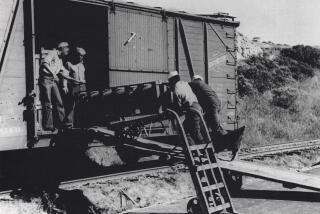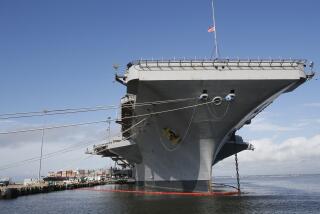Navy Apology in Iowa Blast Case Expected
- Share via
WASHINGTON — The Navy is prepared to apologize for saying that a lone sailor could have caused the April, 1989, blast that claimed 47 lives aboard the battleship Iowa, Pentagon sources said Wednesday.
Adm. Frank B. Kelso, the chief of naval operations, is expected to make the announcement at a Pentagon briefing today, based on a new report on the huge explosion that ripped through a gun turret aboard the vessel.
The Navy’s initial investigation concluded that the explosion “most probably” was an intentional act by Gunner’s Mate Clayton M. Hartwig, who was described as despondent over a failed relationship.
The Navy accused Hartwig, who was killed in the blast, of placing “some type of detonation device” between gunpowder bags as he supervised the loading of one of the ship’s 16-inch guns. The service did say that the evidence was circumstantial.
Several members of Congress were critical of the report, saying the Navy in its zeal to lay the incident to rest had caused humiliation to Hartwig’s family.
Lawmakers attacked the Navy’s conclusions and demanded new studies.
In June, 1990, Navy Secretary H. Lawrence Garrett III ordered the investigation reopened after the unexpected ignition of gunpowder in the course of a series of tests that had been ordered. The report to be unveiled by Kelso stems from that action.
“It’s an apology. He’ll do it publicly,” a senior Pentagon source said, speaking on condition of anonymity.
Kelso is acting because the Navy’s latest studies are “inconclusive” as to exactly what caused the blast, said another source knowledgeable about the report. “The Navy has been going in this direction for some time.”
Kelso inherited the issue from his predecessor, Adm. Carlisle A. H. Trost, who has since retired.
The sources said that after more than a year of tests and analysis by the Navy and independent scientists, it appears that the blast may have been an accident after all and not sabotage.
The sources said studies conducted by the Navy and independent scientists have been unable to agree on a specific cause for the blast.
The explosion occurred during a training exercise in waters about 300 miles north of Puerto Rico.
More to Read
Sign up for Essential California
The most important California stories and recommendations in your inbox every morning.
You may occasionally receive promotional content from the Los Angeles Times.












